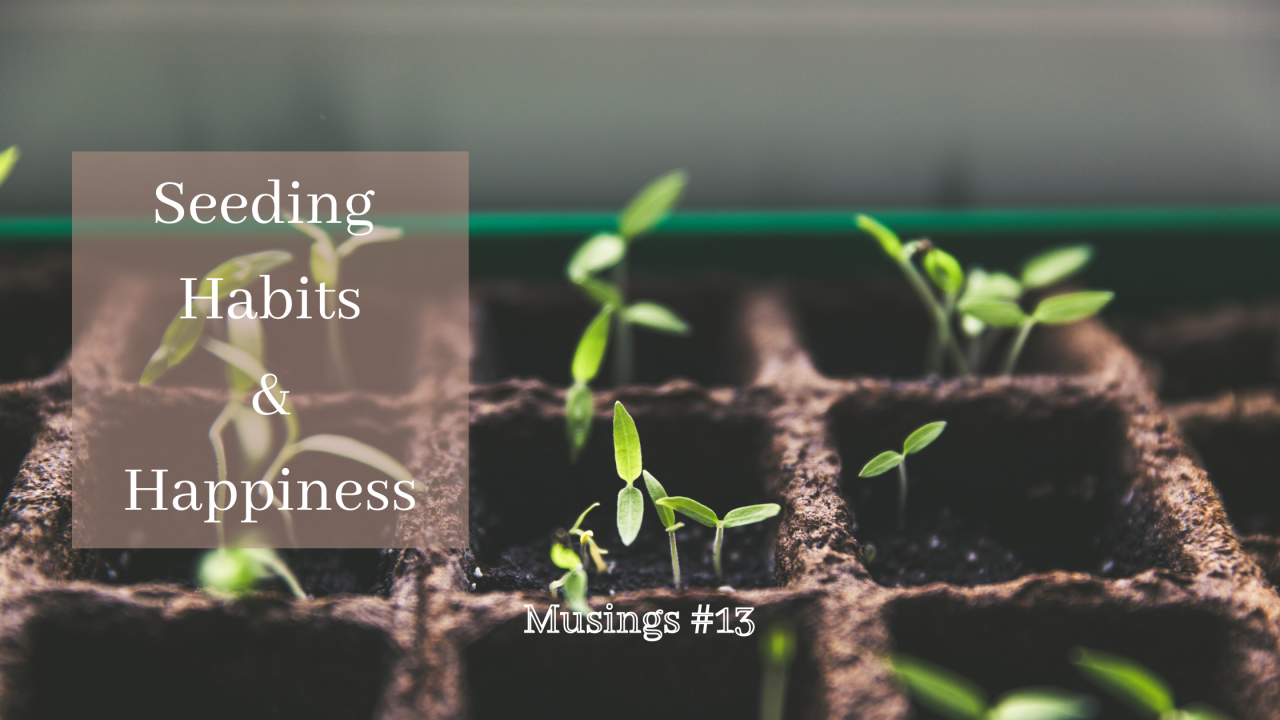“We are what we repeatedly do. Excellence, then, is not an act, but a habit.” – Will Durant in History of Philosophy (sometimes wrongly attributed to Aristotle)
“Welcome late Mr. Daniel!” That is how my class teacher used to welcome me every time I was late for her high school class. Being tardy is one of my worst habits, and most of my friends and colleagues know this and have made fun of me for years. But, over time, I realized that this and many other such habits were holding me back. Over the years, I have systematically worked on culling many of these habits and, more importantly, inculcated many healthier ones. Whether we realize or not, habits contribute a lot to our success, and some even impact our happiness.
“You do not rise to the level of your goals. You fall to the level of your systems.” – James Clear in Atomic Habits
In this musing, and over the next few ones, I want to share some of the areas that I’m personally passionate about and the habits around them, hoping that this will get a dialogue started on these topics. Here are some of the areas where we have consciously or unconsciously developed habits (I’m fully aware that each of our interests differ and so please write your lists here):
- Additive Areas: Reading, Writing, Music, Health, Family, Meditation/Prayer, etc.
- Areas that can turn Negative: Television, Junk Food, Social Media, etc.
There are many good books and articles written on Habits, and it’s worth studying three books in particular: Tiny Habits by BJ Fogg, Atomic Habits by James Clear, and Power of Habits by Charles Duhigg.
There are a few common themes that we can pick up that are key to developing the habits we want to cultivate and ones we want to eliminate. A framework that has worked for me is to start with the Motive (M) for a habit, figure out the Behaviours (B) around the motive, and what makes them Attractive (A). Then comes the Capability (C) to perform that action in response to a Cue (C) and, once done, how to Reward (R) the completion. [Acronymn: MBA in CCR – MBA in Creedence Clearwater Revival for the Rock music fans out there]. Now let us look at these individually with the example of someone aspiring to “Reduce Stress.”
- Motivation(M): Identify why “Reducing Stress” is important to us. It is essential to dig deep and understand why this particular habit matters and how this will impact our identity – e.g., we want to be happier in life, living in the present, and have a clear head. And not just focus on the outcomes – e.g., it will help me work harder.
- Behaviors(B): Motivated as we might be to “Reducing Stress,” our motivations quickly fluctuate with time and so it is essential to identify behaviors surrounding this aspirational habit. BJ Fogg talks about creating a ‘Swarm of Behaviours’ surrounding your core aspiration. He talks about using a magic wand to create any behavior that we wish as part of this exercise to generate as many ideas as possible to aid our core aspiration. For the example of “Reducing Stress,” it could be: Meditate every day, exercise daily, play music every day, play with my dog, spend time with kids, etc.
- Attraction(A): The more attractive the behavior is, the more likely it is to become habit-forming. Let us say that we want to develop “playing guitar” as the behavior – figure out all the ways you can make that attractive, including joining a group where this new behavior is the “norm.” In this case, maybe we get together with family, friends, or colleagues who play music and figure out a way to start working on a song together.
- Capability(C): This is a crucial step of the whole process – and this is where most of us fail. We have to make the behavior very easy and something that we can easily do in less than 5 minutes to start with. For example, pick up the guitar and practice basic chords for 5 minutes daily, for a week. As simple as that. Start with something so easy that there is no excuse not to do it. You will see that as your repeat, this seed behavior will start to grow. Planting the seed is the most crucial step here.
- Cues (C): Another critical aspect is to figure out the exact time and location where we would perform the activity. In particular, have a good cue (or prompt) on when we will do the specific activity identified in the previous step. For example, as soon as I finish work at 6:30 pm, I will pick up the guitar and play for 5 mins. As we get better at this, we can start stacking habits. As soon as I finish work, I will close my computer, play the guitar for 5 mins, and meditate for 5 mins. Habit stacking is a very powerful technique.
- Rewards (R): Whatever we studied so far is how we perform a behavior once, but Rewards is the key to making it a habit. We absolutely have to celebrate each time we complete the action with something meaningful to us. It could be with an immediate treat, a shout of joy, a high five to a family member, check it off in a habit-tracker – whatever makes us happy and emotionally connect with the behavior. It sounds trivial – but this is a crucial step in building your habit and will ensure that you repeat the steps over and over again till it becomes second nature to us.
Whoever is soft and yielding is a disciple of life. The hard and stiff will be broken. The soft and supple will prevail. —LAO TZU
As we practice developing new behaviors into habits, it is also essential to stay flexible and try out different ways of inculcating the new behavior – try different cues, different rewards, different times, different locations – anything that increases the odds of success. Also, be forgiving when we occasionally let up on the behavior. The key is not to give up but to get back on the horse and grind it out with Grit.
Highlights
Breaking bad habits: We might be thinking, how to break a bad habit that we already have. In my case, it was tardiness, and I mapped out all the “behaviors” that led to this and led to systematically eliminating them and also figured out a way of measuring being on time and this became a big reward for me. I started doing this for a week first and then started extending it – and over the last 1200+ meetings, I have been on-time 98.3% of the times. That is less than a total of 5 mins late daily over ten meetings (average). And this is still a work in progress, and I hope to improve even further. The following is an excellent video on identifying and breaking habits that hold you back – using techniques from the “Power of Habit.”
Untold Seed Stories: On the topic of habits, Podcasting is something I picked up over the last three years and have continuously worked on improving. And this week, we seeded a new podcast mini-series called “Untold Seed Stories” which captures the first 500 days of a startup’s journey. Please do check this out and let me know your feedback. I’m super excited that this podcast also has new intro/outro music from a favorite guitarist of mine called Prasanna (who was a pioneer in playing Carnatic music on the electric guitar). You can check out the full song here.
Spotlight
Habits for Happiness: As a father of two girls, when I initially read the story of how Neil Pasricha started writing a book to his then soon-to-be-born kid about how to be happy in life, I loved the concept. He is the author of many books, but “The Happiness Equation” has some great habits that we can all consider adapting to make our lives happier. After all, what is the point in developing tons of habits and being more productive and wealthy if we cannot be happy?
Productivity
Habit Tracking: Finally, if we want to get better at developing habits, it is vital to have a reliable habit tracking mechanism that works for us. It could be a pen and paper-based, using a productivity tool like Notion or a customized app. Here is is a good video comparing different apps – try them and see what works for you.
Quote
That’s about it for this week, friends. I would love to hear what habits have contributed the most to your success and ones that hold you back. Any techniques that worked for you that we missed? What are the habits that bring you happiness? Please share in the comments below to learn from each other and bring habits and happiness into each other’s lives.





